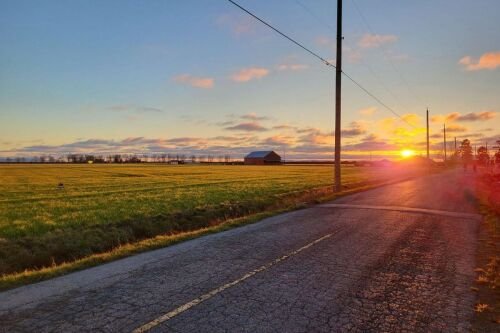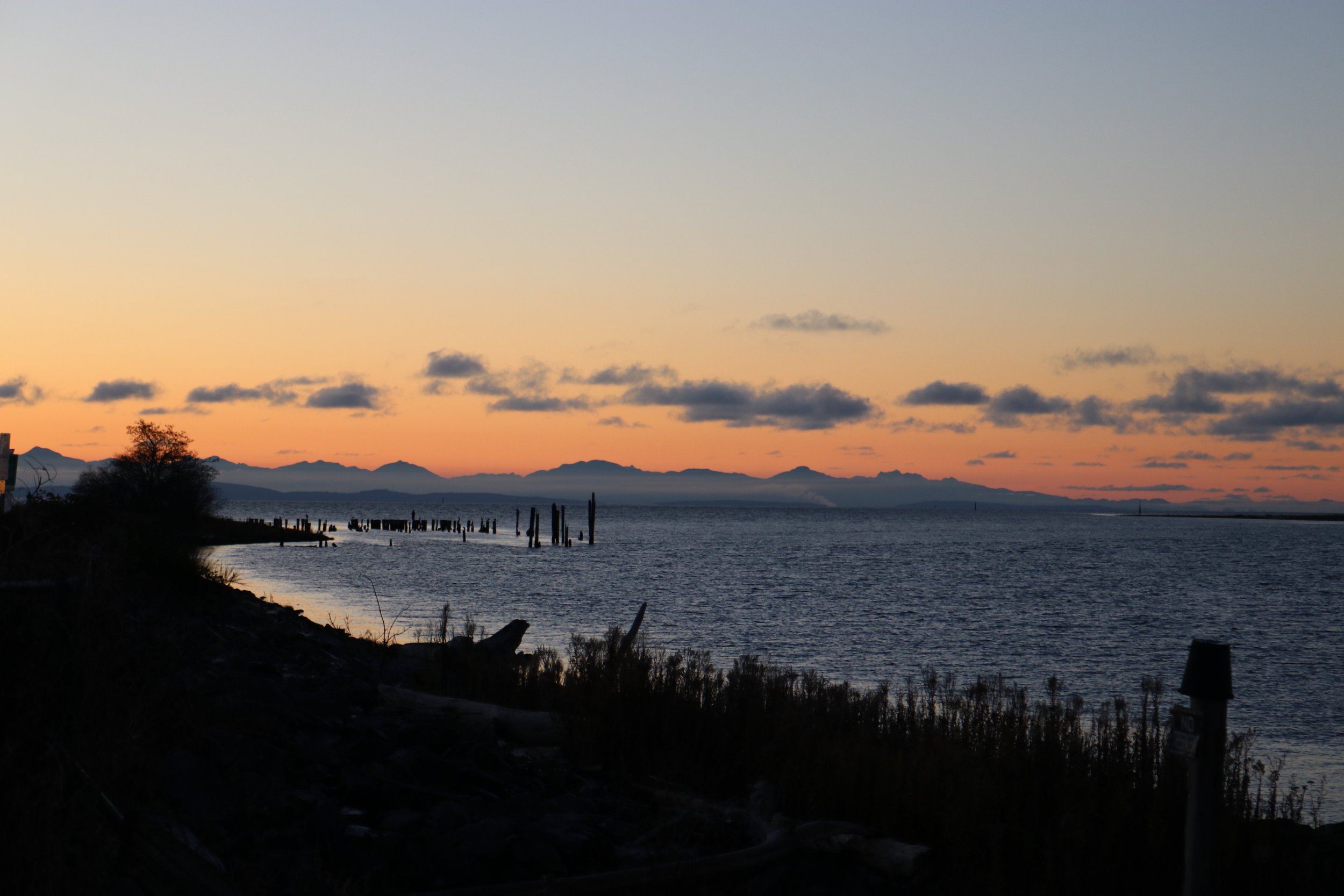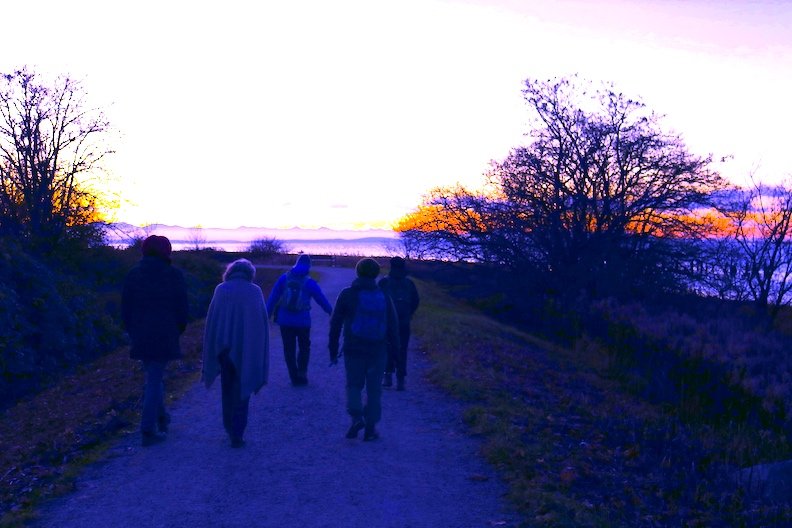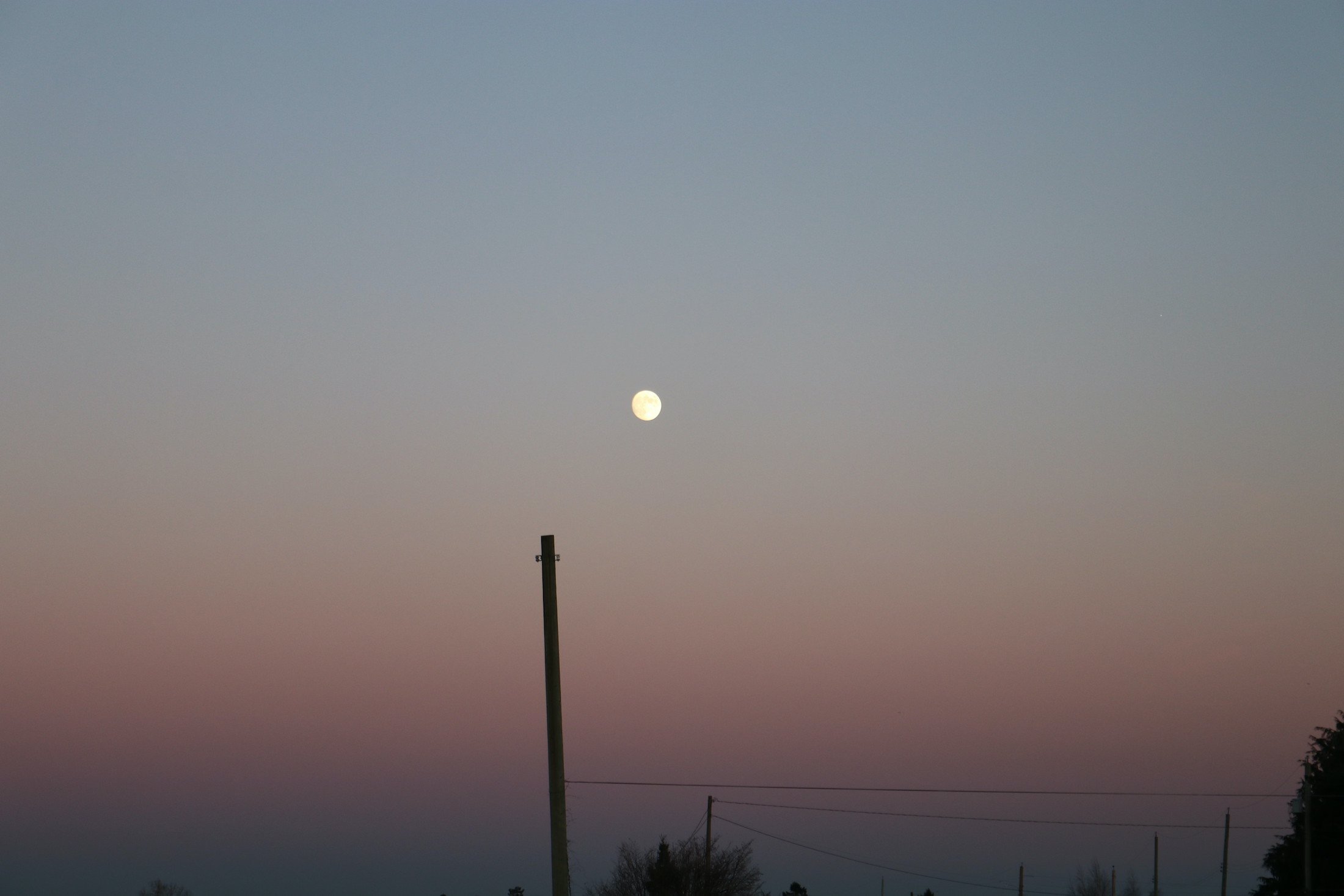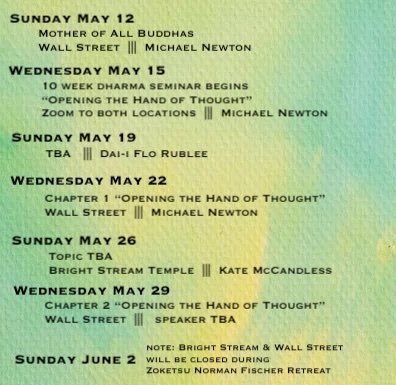Engaged Buddhist Practice – Nature Walk
/November 2023 members of the Engaged Buddhist Practice group went for a full-moon walk in the Roberts Bank Wildlife Management Conservation Area, Fraser River estuary, Salish Sea.
The night was perfect – hardly a cloud in the sky. We walked along the dyke as the sun went down and enjoyed the sunset concurrent with the emergence of a harvest moon. It appeared five times its size initially, slowly shrinking and changing colour from bright amber to a pale grey disc.
The Coast Salish peoples have been in reciprocal relationship with these lands since time immemorial. Yet, on our Nature Walks we are quickly becoming aware of the friction between human beings and nature, which was especially true this time. As the November sky darkened, the otherworldly lights of Westshore, Canada’s busiest coal export terminal, became brighter and more obvious, adding an eerie glow to the ambience, making it difficult not to think too hard about the environmental damage caused by the port expansion and coal shipments passing through.
To put this in context, the coal terminal is situated within the Fraser River estuary, a globally significant ecosystem. The estuary’s waters support millions of migrating salmon at early and adult stages of development while its marshes and bogs provide essential resting and feeding areas for migratory birds on the Pacific Flyway. The area is considered one of the richest and most important ecosystems for migrant and wintering water birds in Canada.For a deeper appreciation of the marvelous and complex ecology of the estuary, do watch THIS.
Despite all this cultural and environmental richness, if you’ve ever gone to catch a ferry in Tsawassen, you will have seen the train tracks and monstrous coal port.
Did you know:
Vancouver’s various coal facilities exported 36.8 million tonnes of coal in 2017, and according to the Vancouver Fraser Port Authority, Westport handles more than 33 million tonnes of this coal annually. This places Vancouver well above Norfolk, Virginia, the busiest coal port in the United States. MORE INFO
According to emissions formulas used by the Sierra Club, Vancouver’s 2017 coal exports will produce 99.8 million tonnes of CO2 over their lifetime. This is significantly higher than B.C.’s entire carbon footprint.
Some of this coal is metallurgical coal from mines in the interior of British Columbia, operated by companies such as Teck Resources and exported to Asia for the making of steel. This coal mined within British Columbia pays a provincial carbon tax on its embodied emissions.
In recent years, Vancouver’s coal ports have also accommodated a massive increase in exports of thermal coal, which is used for the production of electricity. Some of this exported coal is mined within the United States, in particular in the Powder River Basin. Along the West Coast of the United States, six proposed facilities were scrapped as communities rejected proposals for coal export terminals for environmental reasons. Native American tribes directly affected by these proposals led the charge.
In B.C. similar projects are not subject to the same rigorous review, partially as a result of the gutted Canadian Environmental Assessment Act. This makes B.C., thanks to our existing terminals and growing port capacity, the last hope for desperate coal producers in the Powder River Basin, hoping to get their product to market before thermal coal goes extinct. MORE INFO
On top of that, American coal exported through Roberts Bank does not pay a provincial carbon tax. If the provincial government wanted to, it has the power to recoup some of these costs under the Climate Leadership Plan. We can’t apply the carbon tax to coal mined outside our borders, but we could impose an equivalent levy. This regulatory fee would level the playing field with B.C. coal producers and ensure all exporters pay something to mitigate the adverse impacts of their industry.
Why this failure of climate and economic leadership in government?
Political donations from U.S. thermal coal players like Burlington Northern Santa Fe and Fraser Surrey Docks together are in the tens of thousands of dollars to the governing party, with high hopes for the coal terminal proposed at Fraser Surrey Docks.
Metro Vancouver has benefited handsomely from the presence of the coal industry, according to numbers compiled by the B.C.-based Coal Alliance. Between 2012 to 2017, coal-related companies spent $2.29 billion in Metro Vancouver, including $470 million in the City of Vancouver proper.
However, there is hope, and there are actions that can be taken:
“In Zen, our practice is about taking nothing for granted. All has been given to us and it is a sacred act to acknowledge the gift of this life; this body, each other, our temple (zendo), the earth on which we stand, the trees, the birds and all creatures, the wind and sky.”
Rights of Nature is a growing body of law that seeks to reframe how nature is conceptualized under the law, and how it is governed, by broadening the legal rationale for its protection. A new report, Rights of Nature : Pathways to Personhood for the Fraser River Estuary by researchers from the University of British Columbia and Raincoast Conservation Foundation seeks to determine how granting the Fraser River Estuary legal rights could produce much-needed changes to governance in the region and how those changes could recover species at-risk. MORE INFO
For more inspiration, read HERE about how the Georgia Strait Alliance is a leading advocate for the protection of the Salish Sea.
-blog written collaboratively by Augusta Lockhorst, Angela Kayira, and Naomi Steinberg
